🌾 Dry It, Pack It, Profit! Launch a Dehydrated Food Venture from Home
In India, tons of fruits and vegetables go to waste every day due to lack of storage and preservation methods. But what if you could turn that wastage into a profitable business right from your home? The dehydrated food business is one of the fastest-growing small-scale opportunities — ideal for farmers, women entrepreneurs, SHG members, and home-based business seekers. Let’s walk through how you can start this business step-by-step with low investment and high returns.
Kunal R. Mulik
6/23/2025
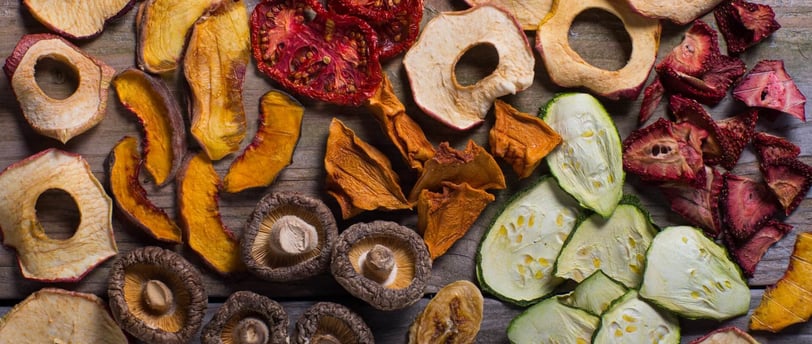

✅ What is Food Dehydration?
Food dehydration is the process of removing moisture from food items like fruits, vegetables, herbs, and more — using a dehydration machine. It helps:
Preserve food for longer shelf life
Reduce the size and weight for easy storage
Lock in nutrition without any chemicals or preservatives
🌟 Benefits of Dehydrated Food Business
✅ Small investment, scalable returns
✅ No need for cold storage
✅ High market demand (India & abroad)
✅ Home-based setup possible
✅ Year-round income, less wastage
🛠️ Requirements to Start the Business
Here’s what you need to get started from home:
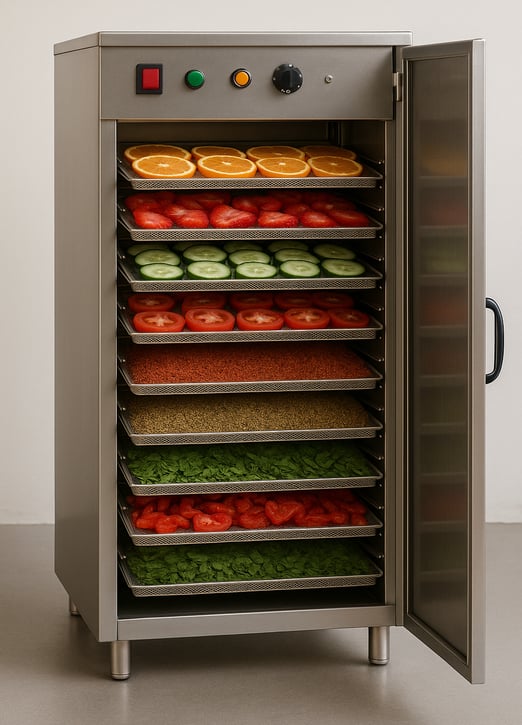

1. Dehydration Machine
Compact electric dryer with 5–25 trays (available in different sizes)
Stainless steel body, food-grade quality
Easy plug-and-play operation
Manufactured by Indian companies like Abhishek Enterprises, Sangli.
2. Raw Materials
Locally available fruits, vegetables, herbs: Mango, Banana, Tomato, Amla, Ginger, Beetroot, Moringa, Mint, Garlic, Onion
3. Clean Workspace
A hygienic room at home for drying, packing, and labeling
Proper ventilation & dust-free environment
4. Packaging Materials
Stand-up pouches or zip-lock bags
Food-grade plastic or paper bags with sealing
Customized labels with branding, date, MRP, ingredients
5. Licenses & Registrations
FSSAI Registration (basic food license)
GST (optional for turnover below ₹20 lakhs)
Udyam Registration for MSME benefits
Local Shop Act if hiring workers
🔁 Process: Full Steps in Detail
Step 1: Decide Your Products
Choose one or multiple based on availability and demand:
Fruits: Banana chips, mango slices, dried amla
Veggies: Tomatoes, onions, beetroot
Herbs/Roots: Mint, turmeric, ginger
Powders: Onion powder, moringa powder
Step 2: Wash, Peel, Pre‑treat
Wash thoroughly under clean water.
Peel if required (e.g. mango, ginger).
Blanch items like spinach, beetroot—hot water at ~150 °C for 2–4 min—then cool in cold water
Step 3: Slice & Chop
Use vegetable slicer machines, adjustable from 0–15 mm, stainless steel built—ideal for uniform slices
For smaller pieces or julienne cuts, use electric chopper machines (1 HP, 5 kg bowl, 50–70 kg/hr. capacity)
Uniform pieces ensure even drying – preventing over/under drying
Before drying, prepping with the right machines—like slicers and choppers—saves time, ensures uniform slices, and improves quality. Abhishek Enterprises offers these as well, alongside the dehydration and grinding machines.
Step 4: Dehydration
Load single-layer batches on stainless trays.
Choose optimal settings:
Leafy herbs: 45–50 °C for 4‑6 hrs.
Onions/garlic: 60 °C for 6‑8 hrs.
Fruits: 55 °C for 8‑10 hrs.
Ensure airflow; rotate trays regularly for uniform drying.
Step 5: Grinding to Powder
After cooling, load fully dehydrated items into a dry grinder/pulverizer.
Grind finely and sieve for uniform texture.
Suitable for: Onion powder, ginger powder, herbs, superfood blends
Step 6: Packaging & Labeling
Use moisture-proof stand-up pouches, jars, or zip-lock bags.
Label includes:
Name, weight, date of packing
Expiry (6–12 months), FSSAI license, ingredient list
Branding, batch no., storage instructions
Step 7: Storage & Sales Channel
Store in cool, dry, dark place.
Sell locally (kirana shops, health stores) and online (WhatsApp business, Instagram, Amazon).
Offer sample packs and combo sets like “Spice Powder Pack” or “Herbal Tea Mix”.
💡 Equipment List:
✅ Why Use Machines?
Uniformity ensures consistent drying.
Efficiency: Slicer and chopper handle bulk work quickly.
Quality: Maintains texture, color, and nutrients.
📣 Marketing Tips
🌀 Make Instagram reels: “Before-After” dehydration
🌿 Educate people on health benefits (no preservative, natural, long shelf life)
💬 Use WhatsApp Business for order taking
📦 Offer sampler packs and combo kits
🛒 Partner with organic stores, caterers, and gyms
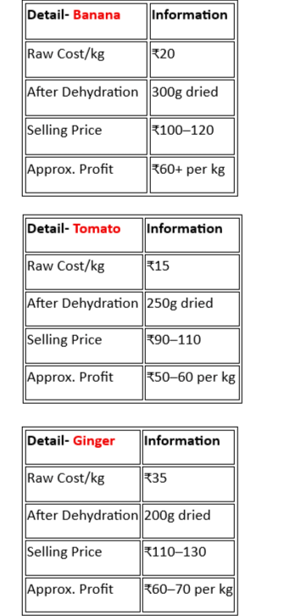
📊 Investment & Profit Example
💡 You can scale gradually by increasing machine size or adding more products like spice blends, herbal teas, or dry fruit mixes.
❌ Mistakes to Avoid
Using poor-quality raw material (affects taste & texture)
Skipping hygiene during preparation
Not drying properly (leads to spoilage)
Weak packaging (can absorb moisture)
Forgetting licenses and FSSAI compliance
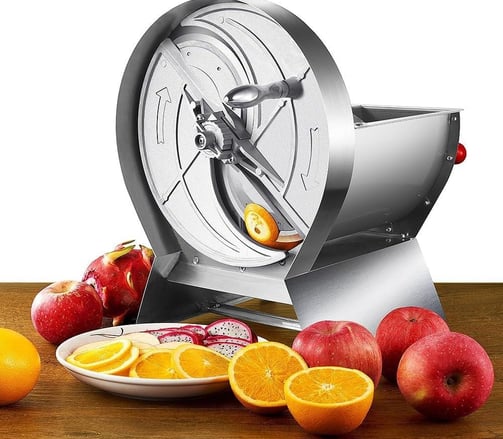

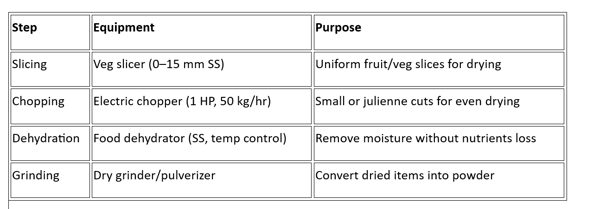
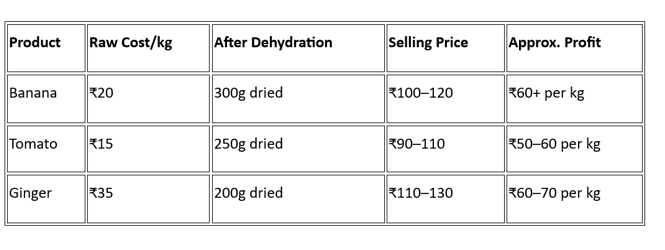
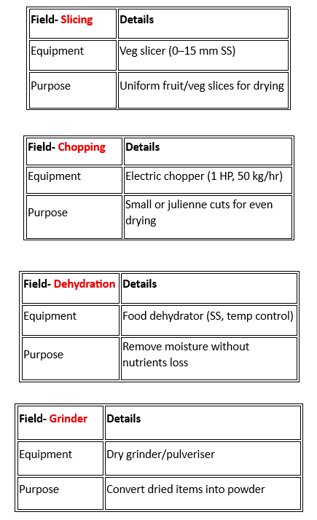
📌 Get Your Dehydration Machine & Business Support From:
Abhishek Enterprises, Sangli
Manufacturer of Food, Industrial & Agricultural Machines
📍 Plot No. 114/115, Dr. Vasantdada Industrial Estate, Sangli
📞 +91 9975189971
👉 Call us today for personalized guidance, machine demo, and full setup support for your dehydration and powder-making business!
Quality
Manufacturing top-notch food processing, industrial, agricultural machines.
Innovation
Efficiency
+91 9975189971 +91 8329053381
© 2024. All rights reserved.
